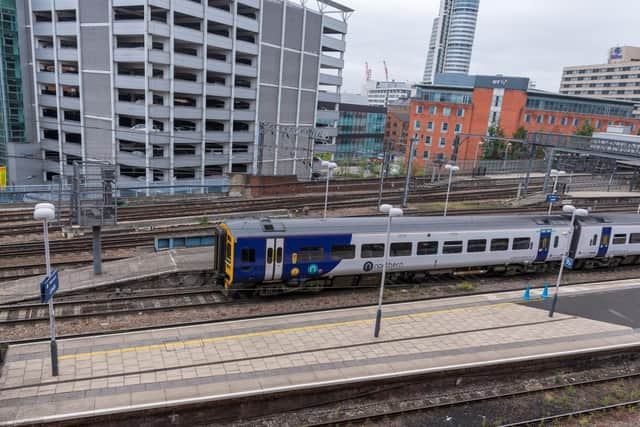As North's smart ticketing plans are scrapped, report warns of 'lack of continuity' holding back region's railways
The Northern Rail Industry Leaders (NRIL), a group of more 150 rail businesses in the North, has set out how Transport for the North can embrace innovation to deliver transformational improvements.
But their report comes as TfN prepares to close its £150m smart ticketing programme designed to create a London-style 'pay as you go' transport system after the Department for Transport (DfT) slashed the organisation’s funding.


Advertisement
Hide AdAdvertisement
Hide AdThe strategic transport body learned last month that its funding from Government would be much lower than for this year and would not cover the costs of its plans.
This put its smart ticketing ambitions in jeopardy and TfN’s board will now meet on Thursday to approve the closure of its Integrated and Smart Travel (IST) programme.
The NRIL report, published yesterday, sets out how "innovation can be a key driver of Transport for the North’s vision for a thriving North of England that is underpinned by a world class transport system".
And in its chapter about 'people', it calls for a "culture that welcomes new ideas and where failure is not penalised, developing a ‘fail fast, fail cheap’ culture which can ultimately reduce the cost of innovation."
Advertisement
Hide AdAdvertisement
Hide AdBut it describes a broader "skills and talent" challenge faced by the industry, which suffers from an "ageing workforce and lack of a diverse talent pipeline".
The report notes: "UK rail has long been susceptible to a lack of continuity, fragmentation, and frequent changes in direction.
"This, driven by economic and political cycles has created an environment in which organisations struggle to commit resources and undertake long term planning. In turn, this can block investment in areas of research, technology, and innovation.
"The lack of a consistent rolling programme (outside major renewals) causes a loss of momentum and expertise, with the uncertainty often leading those working within rail to look for more secure employment options."
Advertisement
Hide AdAdvertisement
Hide AdAmong its recommendations are defining an innovation funding strategy for TfN that specifies sources and means of accessing funding and developing a plan to harness the inherent capability of northern small businesses, consultants and universities.
Co-authors of the report, Rhianne Evans and David Taylor both from Thales, said: “There is a clear case for improving transport links and connectivity across the North through major upgrades, to help boost investment, provide jobs and drive economic growth in the region.
"Against the backdrop of the Coronavirus pandemic, there is now even greater pressure on our industry to deliver these outcomes on time and on budget.
"We also know that TfN faces challenges to decarbonise, increase connectivity and improve accessibility on the network. We believe that innovation is part of the solution to address these challenges."
Advertisement
Hide AdAdvertisement
Hide AdMeanwhile, TfN, which was set up to transform the North's transport links, has launched new collaborative approach to infrastructure planning and policymaking.
The Northern Evidence Academic Forum will hold its first meeting next week to connect the region’s policy and decision-makers with the academics who are undertaking the cutting-edge research that could help shape and inform those choices.
A DfT spokesperson said: “TfN was allocated up to £150m at the 2015 Spending Review to support its Integrated and Smart Travel programme. To date, £24m has been utilised to enable the roll-out of smart ticketing across the north.
“We are focused on delivering more modern journeys for passengers, so are now considering how to deliver a more rapid and effective rollout.
Advertisement
Hide AdAdvertisement
Hide Ad“The Transport Secretary has spoken with Northern leaders extensively, including in late December, to discuss their priorities. The Northern Transport Acceleration Council is now considering how a range of northern projects can be delivered more effectively.”
Comment Guidelines
National World encourages reader discussion on our stories. User feedback, insights and back-and-forth exchanges add a rich layer of context to reporting. Please review our Community Guidelines before commenting.